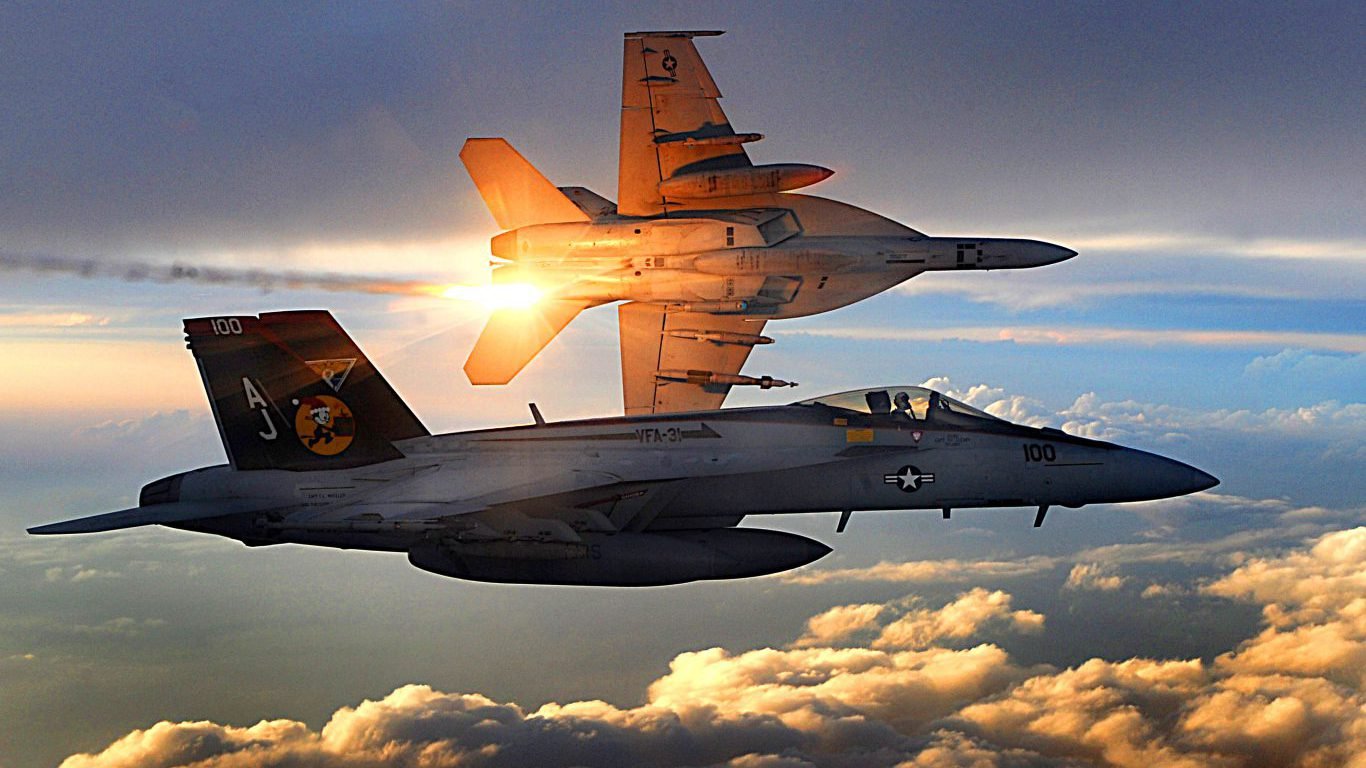

Technology has swept investors up over the past few years. With the mega-caps all posting solid results last week, many investors are looking for somewhere to move capital. While tech will continue to roll, the same may not be said for the rebound in the economy. The extra unemployment benefits have run out, it will be a while before another round of stimulus checks gets to citizens and uncertainty remains the one constant.
[in-text-ad]
A new RBC research report from Michael Eisen and the aerospace and defense team says what many experienced investors are well aware of: the outlook forward remains positive because defense especially will get funded by the government. The report noted this about the sector’s underperformance over the past three months:
Defense exposure continues to provide a more stable fundamental backdrop. Investor concerns regarding the outlook for defense budgets has weighed on the sector’s valuation, which we think has been overstated. The group has appreciated on average by 4% over the past 3 months, vs. +16% for the S&P 500. Earnings results from the Defense contractors have all held in much better than feared, delivering headline beats for all companies with a majority of sales to the end market. Book-to-bill ratios also held above 1x across the board, with the strongest backlog growth coming from space based programs. In contrast, the outlook for Commercial demand has turned more bleak as the spread of COVID-19 continues to trend in the wrong direction.
We screened the RBC coverage universe looking for mega-cap leaders that are rated Outperform, and four look like outstanding ideas for investors looking to gain a more defensive posture, literally and figuratively, for the rest of the year.
Boeing
This company has had a public relations nightmare due to the 737 Max issues. Boeing Co. (NYSE: BA) is the world’s leading aerospace company and the largest manufacturer of commercial jetliners and military aircraft combined. It is also one of the most valuable brands in the world.
The different segments in the company are Commercial Airplanes, Boeing Defense, Space & Security and Boeing Capital. The latter provides financial solutions facilitating sale and delivery of Boeing commercial and military aircraft, satellites and launch vehicles.
The analysts noted this:
CEO Dave Calhoun stated that the company is “prudently and proactively reviewing every aspect of our company.” This could result in the divestiture of business lines to sharpen the company’s focus and provide incremental capital to fund operations and future R&D.
While the macro environment is still highly uncertain, many on Wall Street believe Boeing can communicate greater visibility and confidence in all the key matters the company faces. Recertification test flights have begun, customers have had more time to make near-term and long-term fleet planning decisions, and Boeing secured $25 billion of additional liquidity with the May bond issuance.
The RBC price objective for the shares is $194, while the Wall Street consensus target is lower at $175.77. Boeing stock closed Thursday trading at $172.20.
General Dynamics
This company, like other major defense prime contractors, has had a solid year, and the balance of 2020 could be better. General Dynamics Corp. (NYSE: GD) is engaged in business aviation, land and expeditionary combat vehicles and systems, armaments, munitions, shipbuilding and marine systems, and information systems and technologies.
Major products include Virginia-class nuclear-powered submarine and Ohio class replacement, Arleigh Burke-class Aegis, Abrams M1A2 tank, Stryker eight-wheeled assault vehicle, medium-caliber munitions and gun systems, tactical and strategic mission systems.
Some Wall Street analysts were disappointed by quarterly results from the company’s information technology segment. Though most don’t view the segment’s struggles as a product of a structurally impaired business, some may begin to question that thesis. However, most continue to see value in the company’s Marine, Aerospace, Mission, and Land businesses and view the overall valuation as depressed.
General Dynamics stock investors receive a 2.95% dividend. RBC has a $164 price target, though the consensus estimate is up at $172.11. The last trade on Thursday hit the tape at $149.14.
L3Harris Technologies
This recently merged company is now the sixth-largest defense firm. L3Harris Technologies Inc. (NYSE: LHX) is an agile global aerospace and defense technology innovator, which engages in the provision of defense and commercial technologies across air, land, sea, space and cyber domains. It operates through the following segments.
[in-text-ad]
Its Integrated Mission Systems segment includes intelligence, surveillance and reconnaissance; advanced electro, optical and infrared; and maritime power and navigation. The Space and Airborne Systems segment comprises space payloads, sensors and full-mission solutions; classified intelligence and cyber defense; avionics; and electronic warfare. Other segments include Communication Systems and Aviation Systems.
The analyst noted that following the merger between L3 Technologies and Harris, the company noted it would be divesting 8% to 10% of top-line noncore items. So far, only some of the goal has been completed.
Shareholders receive a 1.96% dividend. The $219 RBC price target compares with the $235.00 consensus figure. L3 Harris Technologies stock was last seen trading at $173.67 a share.
Raytheon Technologies
This company has a diversified mix of business and its shares are down a stunning 20% since June. Raytheon Technologies Corp. (NYSE: RTX) is an industry leader in defense, government electronics, space, information technology and technical services. The company operates in four principal business segments: Integrated Defense Systems, Intelligence, Information and Services, Missile Systems, and Space and Airborne Systems. It is among the companies that make the most from the U.S. government.
With a history of innovation spanning 97 years, Raytheon provides state-of-the-art electronics, mission systems integration, C5I products and services, sensing, effects and mission support for customers in more than 80 countries.
Last year, Raytheon and United Technologies agreed to merge their businesses to create a new aerospace and defense powerhouse. The two companies received unanimous approval from their respective boards and the merger is finally complete. Given the merger and the spin-off of Carrier and Otis, many Wall Street analysts feel that the market is overlooking the path for free cash flow to step up to $6.2 billion by 2022. Any recovery in air travel or improvement in sentiment would help drive the commercial aerospace business.
Shareholders receive a 3.17% dividend. RBC has set a $70 price objective. The consensus target price is $74.69, and Raytheon Technologies stock closed trading at $59.87 on Thursday.
Investors know the old sports cliches like defense wins championships and the best defense is a good offense, but the reality is this sector never truly goes out of favor. While gains by Democrats in November could dampen prospects somewhat, budgets and projects are set and well underway for 2020 and beyond.
Take This Retirement Quiz To Get Matched With A Financial Advisor (Sponsored)
Take the quiz below to get matched with a financial advisor today.
Each advisor has been vetted by SmartAsset and is held to a fiduciary standard to act in your best interests.
Here’s how it works:
1. Answer SmartAsset advisor match quiz
2. Review your pre-screened matches at your leisure. Check out the advisors’ profiles.
3. Speak with advisors at no cost to you. Have an introductory call on the phone or introduction in person and choose whom to work with in the future
Take the retirement quiz right here.
Thank you for reading! Have some feedback for us?
Contact the 24/7 Wall St. editorial team.
 24/7 Wall St.
24/7 Wall St.